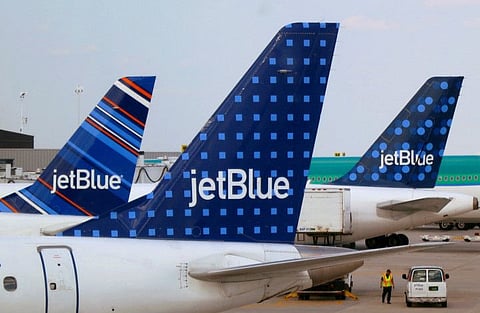American-JetBlue alliance is blocked as anti-competitive
JetBlue shares fell 1.8%Friday in New York, while American slipped 1.5%

New York: American Airlines Group and JetBlue Airways must dissolve a partnership covering flights across the northeastern US after a federal judge agreed with antitrust enforcers that the alliance would reduce competition and boost fares for consumers.
“Though the defendants claim their bigger-is-better collaboration will benefit the flying public, they produced minimal objectively credible proof to support that claim,” US District Court Judge Leo Sorokin said in a ruling Friday.
“Whatever the benefits to American and JetBlue of becoming more powerful - in the northeast generally or in their shared rivalry with Delta - such benefits arise from a naked agreement not to compete with one another,” the judge wrote. “Such a pact is just the sort of ‘unreasonable restraint on trade’ the Sherman Act was designed to prevent.”
The decision hands a win to the Justice Department, which argued the Northeast Alliance, formed in 2020, gives the carriers too much control over competition in Boston and New York City and has led to higher prices for consumers.
The airlines have the option to appeal.
A Justice Department spokesperson and an attorney for the airlines couldn’t immediately be reached for comment.
JetBlue shares fell 1.8 per cent Friday in New York, while American slipped 1.5 per cent.
American and JetBlue are two of the four largest carriers operating in New York, and two of the largest three in Boston, Sorokin noted. Delta Air Lines is the only other carrier with a large presence in Boston.
The agreement between the two “substantially diminishes competition in the domestic market for air travel,” Sorokin wrote. “It does so by combining the Boston and New York operations of two airlines that are among the most significant competitors in that region. These two powerful carriers act as one entity in the northeast, allocating markets between them and replacing full-throated competition with broad cooperation.”

